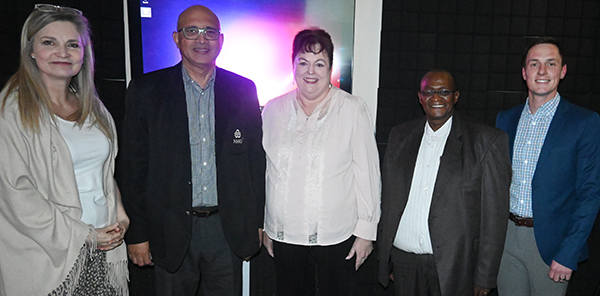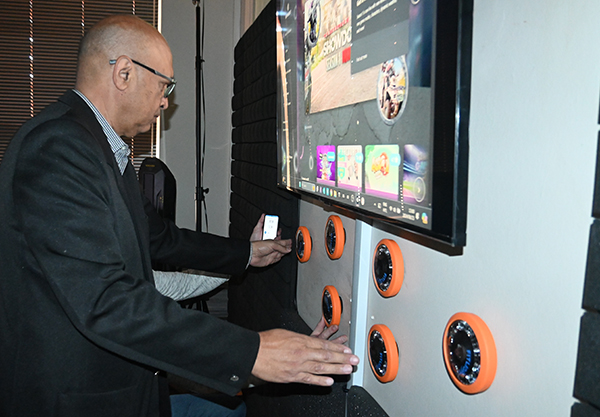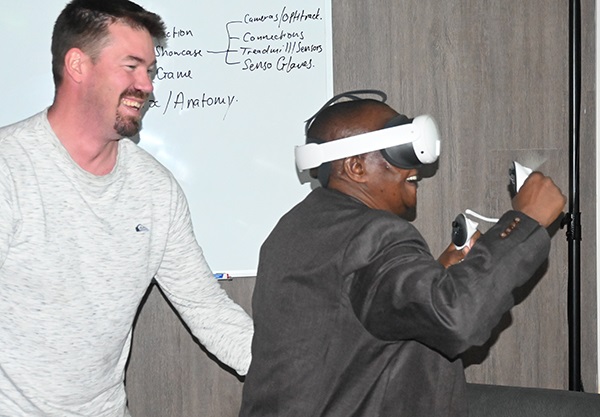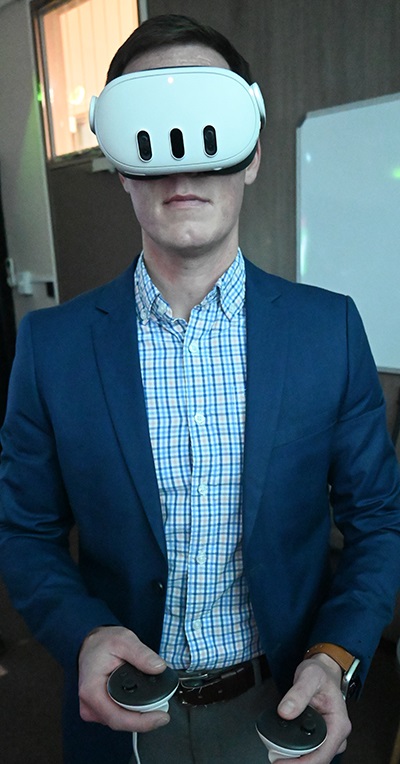The pursuit of greatness without boundaries by the North-West University (NWU) has just had an innovative technological boost with the launch of its virtual reality (VR) simulation laboratory at the Faculty of Health Sciences on 23 August.
Research and teaching and learning have never been more fun: the laboratory offers immersive experiences that not only stimulate the intellect, but also invigorate the senses as it breaks down physical boundaries to open a world of virtual possibilities. Just imagine dodging balls while playing rugby, deconstructing the human body to discover the hidden aspects of its anatomy, conducting patient assessments and interventions, and many other scenarios ─ all in one room.
“What is more, it will make a significant contribution to researchers’ quest to bring about impactful change in the lives of communities, as it will provide valuable data for research and interventions,” says Prof Daryl Balia, deputy vice-chancellor for Information Technology and Campus Operations (Potchefstroom Campus).
The simulation lab, which is the brainchild of a passionate young researcher, Neville Robertson, is hailed as the first in South Africa for psychology and social work. It promises to be an innovative research hub for these and other fields of study at the university.
A leap forward in using technology in psychology and social work
Housed in the Community Psychosocial Research unit (Compres) on the Potchefstroom Campus, the laboratory is impressively equipped. It has everything from VR headsets and a VR-linked treadmill, motion capture cameras and Loco sensors to tailor-made software to assist researchers with data collection.
Prof Retha Bloem, research director of Compres, says the laboratory has special significance for researchers working in communities, as it prepares them for real-life conditions and scenarios. “We want to tackle challenges and see how we can embrace technology to co-create the Africa we want. We believe we are the first university in South Africa to host a facility with this state-of-the-art equipment. We are very proud of and excited about it.”
“This laboratory represents not just a leap forward in technology, but a profound commitment to research, innovation and the future of social sciences and healthcare,” says Prof Jeanetta du Plessis, deputy dean for Research and Innovation in the Faculty of Health Sciences.
She explains that research is the foundation upon which the laboratory was built, and it is key to unlocking its full potential. "Through rigorous inquiry, experimentation and collaboration, it will aid us in discovering new ways to improve mental healthcare, to train our students more effectively, and to make a lasting impact on the communities we serve.”
Prof Awie Kotze, executive dean for the Faculty of Health Sciences, says the laboratory underscores the NWU’s obligation to embrace technology as it meets the deeply human fields of psychology and social work on a highly innovative level.
“Today marks a significant step forward for the NWU and the entire landscape of social science and healthcare in the Faculty of Health Sciences. Traditionally, psychology and social work have been fields grounded in human interaction ─ face-to-face communication, body language and the subtle art of empathy. However, as our world evolves, so too must our approaches. Digital technology has reshaped our understanding of human behaviour, providing us with new tools to study, intervene with and support individuals in previously unimaginable ways. This virtual-reality simulation is a prime example of this evolution.”
VR simulation laboratory is a dream come true for young researcher
The laboratory is the realisation of a dream for Neville, who, as part of his PhD studies, investigated ways to use technology to change the face of psychological interventions through the power of virtual reality.
“I realised that there was no foundation in this regard for researchers who want to use technology in this way. I spoke to Prof Retha, who was my mentor. We concluded that it was a great opportunity to establish something that will also benefit researchers and research in future.”
Neville says the laboratory’s most important impact is that it will give postgraduate students in particular the opportunity to have virtual practice sessions before entering the field of real-life situations and interventions. “Through this, we can make learning through experiencing more accessible to students.”
He envisages that Psychology and Social Work students will not be the only users of the laboratory. “It is a great opportunity for, say, Pharmacy students who want to experience working with chemicals before actually doing it, for Nursing students who want to familiarise themselves with the different aspects of hospitals, or for Engineering students who want to tour a factory, for instance.”
“The possibilities are endless,” he concludes.
For more information on the VR simulation lab or to book a session, contact Neville at 25102273@mynwu.ac.za.

Prof Retha Bloem, research director of Compres, Prof Daryl Balia, deputy vice-chancellor for Information Technology and Campus Operations (Potchefstroom Campus), Prof Jeanetta du Plessis, deputy dean for Research and Innovation at the Faculty of Health Sciences, Prof Michael Temane, deputy registrar, and Neville Robertson, researcher, during the launch of the NWU’s new groundbreaking VR simulation laboratory


Prof Michael Temane, deputy registrar, enjoys a game of rugby while being assisted by Russel Millen, consultant from Innovado. Innovado is the company that assisted in developing the technology for the VR simulation laboratory

Neville Robertson, researcher and innovator, illustrates how to use a VR headset.
